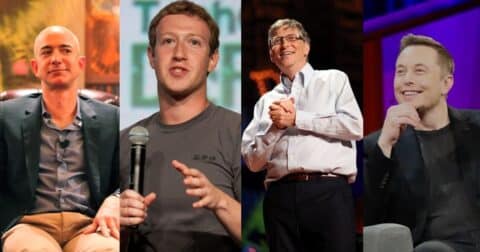Explainer
How Overconsumption Affects the Environment and Health, Explained
Climate•12 min read
Explainer
Who’s putting the most money into making food systems more sustainable?


Words by Seth Millstein
Our food systems are in serious need of an overhaul. Over the last 60 years, per-capita meat consumption has roughly doubled, and is now at unsustainable levels. During that same period of time, the number of billionaires in the world has increased dramatically as well. This confluence of trends raises an important question: what, if anything, are the world’s billionaires doing to fix our food systems, and help us transition into a more climate-friendly way of eating?
Meat production fuels a number of long term environmental impacts, which is one reason why the precipitous rise in meat consumption over the last few decades is such a big problem. The livestock industry is responsible for between 11 and 20 percent of all greenhouse gas emissions globally, with 80 percent of all agricultural land going to livestock production. Beef production is the top driver of deforestation worldwide, and deforestation is an enormously destructive process that destroys ecosystems, reduces biodiversity, erodes soil and emits massive amounts of greenhouse gasses.
At the same time, the world’s population is predicted to swell to 9.7 billion people by the year 2050, which means many more people potentially eating more meat. Researchers warn that the global appetite for meat will eventually exceed our capacity to produce it on this planet.
“I was at a workshop surrounded by pork producers, chicken farmers and dairy farmers, and eight out of 10 of them agreed that they will not be able to meet growing meat [demand] on their own without the other options,” says Sheila Voss, vice president of communications at the Good Food Institute, a non-profit that advocates for alternatives to meat. “We only have finite land and water.”
Despite what some opponents of food systems reform claim, the goal of getting people to eat less meat is not a conspiracy of billionaires trying to replace traditional meat entirely, or aiming to force people to become vegetarians. Efforts to reform the way we produce and consume meat include investments not only in alternative proteins, but also into technologies that aim to make traditional meat production more environmentally friendly, such as feeds that reduce the methane output from cattle. (Though when these turn out to be more marketing gimmick than verifiable solution, the public should be wary.)
While there’s no silver bullet for accomplishing all of these changes, the richest people in the world are certainly in a position to help fund initiatives that move us in the right direction. But have they?
To answer this question, we analyzed the investment profiles of several well-known U.S. billionaires: Jeff Bezos, Bill Gates, Mark Zuckerberg and Elon Musk. Which of them are actually giving away money to improve food systems — and which ones don’t appear to invest in solving this major climate issue at all?
One of the more prolific donors in the field is Amazon founder Jeff Bezos — a little surprising, no doubt, since “Amazon” is hardly synonymous with “sustainable.” As a company that sells and ships physical products around the world, Amazon has an enormous carbon footprint, and while it’s announced several measures intended to reduce its environmental impact, the efficacy of these measures is still unclear.
Bezos himself, however, has spent quite a bit of money to fund climate initiatives, including measures aimed at researching and promoting alternatives to traditional meat. He’s done this primarily through the Bezos Earth Fund, a grant program for funding climate scientists and green initiatives around the world.
“Climate change is the biggest threat to our planet,” Bezos wrote in an Instagram post announcing the fund. “I want to work alongside others both to amplify known ways and to explore new ways of fighting the devastating impact of climate change on this planet we all share. This global initiative will fund scientists, activists, NGOs — any effort that offers a real possibility to help preserve and protect the natural world.”
Bezos, one of the richest men on Earth, seeded the fund with $10 billion of his own money at the outset. That money is meant to be distributed gradually by 2030; as of this writing, $2 billion has been doled out to various climate initiatives, according to the fund’s website.
The fund has committed to spending $1 billion of its overall endowment on food-related projects, with the goal of “transform[ing] food and agricultural systems to support healthy lives without degrading the planet.” A lot of that money has gone to grants aimed at reducing methane output from cattle, while the Bezos’ fund is also funding research into cultivated and plant-based meat.
In 2024, the fund announced that it would be spending $60 million of its endowment on research centers aimed at improving the technology behind alternative proteins. This allocation was soon increased to $100 million, and in May, the first Bezos Center for Sustainable Protein went live at North Carolina State University. The fund intends to build more of these centers in order to “establish a network of open-access research and development centers focused on sustainable protein alternatives, expanding consumer choices.”
In addition to the Bezos Earth Fund, Amazon itself established the Right Now Climate Fund, a $100 million initiative aimed at reforestation and conservation. As cattle farming is the biggest driver of deforestation worldwide, this fund targets efforts, like agroforestry, that are component of food system change.
“We are not turning everybody into vegetarians,” said Andrew Steer, president and CEO of the Bezos Earth Fund, in June. “But we are trying to improve the choice and the health and the vitality of the agricultural system.”
Next on our list is Bill Gates, one of two founders of Microsoft. A vocal proponent of alternative proteins, Gates has called plant-based meat “the future,” and said that wealthy countries “should move to 100 percent synthetic beef” in order to reduce greenhouse gas emissions associated with cattle.
More importantly, he’s put his money where his mouth is, so to speak. Gates has invested in plant-based meat companies like Beyond Meat and Impossible Foods, as well as the cultivated meat company Upside Foods, formerly known as Memphis Meats. Upside Foods is one of just two cultivated meat companies that have been given FDA approval to sell its products commercially in the U.S.
Gates has also given money to Neutral Foods, a food company that aims to be carbon neutral by purchasing carbon offsets to compensate for the emissions its products cause. The Bill and Melinda Gates Foundation has also provided grants to a number of organizations working on alternative proteins, including the Good Food Institute.
Musk’s record on the environment is mixed. There was a time when he had a reputation as an environmentalist, as the success of his electric car company Tesla was seen as a positive step in reducing transportation-related greenhouse emissions.
Over the last few years, however, Musk’s politics have drifted steadily to the right, and that includes his stance on global warming and sustainability. In a recent conversation with Donald Trump, Musk downplayed climate change’s urgency, claiming that “it’s not like the house is on fire immediately” and that “people can still have a steak and they can still drive gasoline cars, and it’s okay.” Musk’s statements are often contradictory, however. He went on to characterize climate action as “something we need to move towards,” albeit “without causing hardship in the short term.” Musk has also praised Florida Gov. Ron DeSantis, who made headlines recently for banning the sale of cultivated meat in his state.
And yet despite all of this, Musk’s company SpaceX has collaborated with Aleph Farms, an Israeli company that makes alternative meat, to investigate the viability of growing cultivated meat in space. In 2022, a four-man team flew to the International Space Station on a SpaceX capsule with cultivated beef cells in tow, and studied the viability of growing those cells into edible meat in zero gravity conditions.
It seems contradictory: Musk’s company participates in an experiment that promotes meat alternatives (in space, at least), yet he’s also vocally downplayed beef’s role in driving climate pollution (back on Earth). While only Musk knows what’s going on in his head, the fact remains that his company has at least played a small role in research to advance cultivated meat technology.
Outside of that, Musk’s company Tesla stopped using animal products in its cars in 2019, replacing the traditional leather seats with vinyl.
Finally, we took a look at investments made by Mark Zuckerberg, founder of Facebook. Zuckerberg has made clear that he has no problem with traditional meat, and he doesn’t appear to have invested in the alternative meat or meat reduction strategies in any significant way (a Zuckerberg-backed fund did apparently invest in biotech company Modern Meadow, maker of leather alternatives, in 2019). He has made headlines, however, with two of his meat-related projects.
In 2011, Zuckerberg announced that for the next year he would only be eating meat from animals that he personally killed. He later explained that this meant he’d “basically become a vegetarian,” since he was killing relatively few animals. He ended the experiment after a year.
More recently, Zuckerberg revealed that he’s been raising cattle on his ranch in Hawaii, with the goal of creating “some of the highest quality beef in the world.” He said that the cows are wagyu and angus breeds, and that he’s feeding them macadamia meal and beer that they produce on the ranch. Zuckerberg was widely criticized for this, in part because it’s unclear whether macadamia meal and beer is a suitable diet for cows.
The billionaires we’ve looked at here are all over the map in terms of their stances on meat. Both Bezos and Gates support efforts to address how much meat the world consumes, while Zuckerberg mostly has other ideas. As for Musk, only he can know what’s going on in his head.
“[Bezos and Gates] are leaning into food systems transformation, and that’s fairly new,” Voss says. “Our food system needs massive help, given the realities and challenges, as well as growing meat demand, and in both of these cases, the Bezos Earth fund and Gates both are supporting multiple interventions. They’re not just putting their eggs in one basket.”
But money talks, and what matters much more than what these people say about meat is how they’ve spent their money. Billionaires and the ultra-wealthy have the resources to significantly improve food systems around the world. A few have made the financial commitment, and hopefully, more of their peers will soon follow suit.